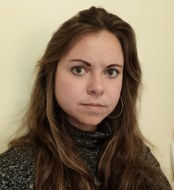Dr Patricia Ward
Table of contents
Contact
 © Patricia Ward // ZfI
© Patricia Ward // ZfI
Research associate
NameMs Dr. Patricia Ward
Project: HumGlobal
Send encrypted email via the SecureMail portal (for TUD external users only).
Information about Patricia Ward
Since 5.2021- Postdoctoral Research Associate with the Center for Integration Studies, TU-Dresden
9.2020-5.2021 Postdoctoral Fellow (Guest Affiliate as of May 2021), Max Planck Institute for the Study of Religious and Ethnic Diversity, Department of Ethics, Law, and Politics
9.2014-9.2020 Ph.D., Sociology, Boston University, Dissertation: How Humanitarian Relief ‘Works’: International Aid Organizations and Local Labor in Crisis Contexts
Transnational Labor, Humanitarian Aid and Development, Migration/Mobility
Trish’s research aims to understand the factors that generate global social inequalities within and across societies. She is particularly interested in social hierarchies, rooted in colonial and imperial imaginaries and articulated as global North-global South relations, inform, condition, and structure policies and practices related to humanitarian aid and development, the global division of labor, and migration/mobility. Her research thus far has focused on these questions within the Middle East context.
Ward, P. 2022. “Worth our work? The (in)visible value of refugee volunteers in the transnational aid sector.” Work, Employment and Society. DOI: 10.1177/09500170221082481
Ward, P. and M. Abudalu. 2022. “Beyond the binary: Harnessing ‘moments of mismatch’ as critical data in global South research contexts.” International Journal of Social Research Methodology. DOI:10.1080/13645579.2022.2115021
Ward, P. 2021. “Capitalising on ‘local knowledge’: The labour practices behind successful aid projects, the case of Jordan.” Current Sociology 69(5): 705-722.
Ward, P. 2020. “‘What do they want from us?’ How locals work to meet their employers’ expectations in Jordan’s aid sector.” Sociology of Development 6(3): 318-337.
Ward, P. 2018. “Place matters: Understanding aid work in Jordan through cafe interviews.” American Center for Oriental Research Blog. <https://www.acorjordan.org/2018/02/06/understanding-aid-work/>.
Ward, P. 2016. “‘Are you really a refugee?’: Exploring academia’s impact on framing current discourse and approaches to resettlement,” in After the Flight: The Dynamics of Refugee Settlement and Integration, M. Poteet and S. Nourpanah (eds), UK: Cambridge Scholars Publishing. 81-102.
Ward, P. 2014. “Refugee cities: Reflections on the development and impact of UNHCR urban refugee policy in the Middle East.” Refugee Survey Quarterly 33(1): 77-93.
Esser, D. and P. Ward. 2013. “Ageing as a global public health challenge: From complexity reduction to aid effectiveness.” Global Public Health 8(7): 745-768.
Information about actual projects
Duration: 1.5.2021-30.4.2023 (Development Phase)
Project coordination: Dr Patricia Ward
Funding: The development phase is funded by the German Federal Ministry of Education and Research (BMBF) and the Free State of Saxony as part of the federal and state excellence strategy. This project is expected to start on 01.05.2023 and is funded by the German Research Foundation.
How does ‘displacement’, framed as an unprecedented global problem, organize society? How do perceptions of someone or something as ‘out of place’ (e.g. refugees, asylum-seekers) mobilize and order ‘the worth’ of human and non-human resources in our world? This project considers these questions in terms of ‘humanitarian logistics’: touted by aid stakeholders as a key component of preventing displacement from occurring in the first place. Scholars and practitioners alike have long documented how aid practices and logistics mitigate but also produce social inequalities. However, the scope and meanings associated with ‘humanitarian logistics’ remain loosely defined and ambiguous.
This project subsequently strives to account for this ambiguity and how it first, may reflect competing logics, between state and non-state actors regarding ‘how’ humanitarian aid should be organized to prevent and respond to displacement. Second, this project looks at this ambiguity to consider how it may also be indicative of changing relations and positions of power within the humanitarian field today, particularly with the ever-growing participation of private sector stakeholders in the sector. This project is particularly attuned to the role of ‘non-Western’ and ‘global South’ relations in this regard, groups that largely remain unaccounted for empirically and theoretically despite their significant roles (The Gulf, for example, is a case in point: boasting the largest facility for the warehousing and coordination of humanitarian relief supplies globally!). Considering the latter expands understandings of how ‘displacement’ organizes what and who is considered ‘in’ or ‘out’ of place in multiple social orders and contexts beyond groups that are usually analyzed and classified as ‘displaced’. While this project is still at the early development stages, it is anticipated that this research will contribute to more rigorous understandings of the relationship between humanitarianism and mobility, and may ‘disrupt’ assumptions undergirding ‘how aid works’ beyond Global North-South explanations.
Note: This project is still in the development phase and is expected to start on 01.05.2023 with funding from the German Research Foundation.
https://tu-dresden.de/gsw/forschung/exzellenzmassnahmen/tudisc
https://tu-dresden.de/gsw/forschung/exzellenzmassnahmen/tudisc/projekte#section-7
